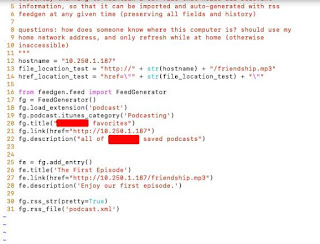Introduction
It is 2023, and there are more free and better tools than before. So attempting (again) setting up my own podcast on a local server.
Scope
Local podcasts, hosted locally via python3 http.server, all local links (raw mp3 taking advantage of Pocketcasts' trim silence ability).
Then, RSS feed on the local site should serve the locations of the mp3's, then is only available when computer is on (security by obscurity).
Process
It largely worked! I still need to learn python a bit more, but pip ensured that had the right tooling on my local computer.
Feedgen worked (was not originally clear that podcast needs to be configured with information first), webpages were served.
Problem
Assuming RSS feed was generated in a way that the apps understood, I had connectivity issues. It seems like the standard way of doing things is to pull from Apple Podcast index (one location of all "curated" and valid podcasts). However, I won't submit my RSS into Apple Podcast because I'm not a podcasting company.
Additionally, it seemed like the apps don't like getting pointed around to local files. Maybe plex is the close second? But Pocketcasts couldn't find my podcast locally, nor could OverCast. And so, moving farther away from original intent to use a nice podcast player (Pocketcasts).
A potential solution could be to host everything on AWS, and then have it served back to me via Apple Podcasts. I'm not very fond of this because then it requires me to learn AWS and/or Azure or some other file storage company's API.
Conclusion
If there's going to be overhead anyways, might as well load into iTunes and manage the raw .mp3 locally. Storage on the phone will be slightly less than doubled because I want to have a local listening speed (1.8x with trim silence) and sharing speed (1.0x for people who haven't heard it before).
It may be a better use of my time to figure out how to use otter.ai more effectively? Seems like 1.8x with trim silence could be a perfect trigger into the transcription service (if it's good enough for human comprehension, good enough for AI).



